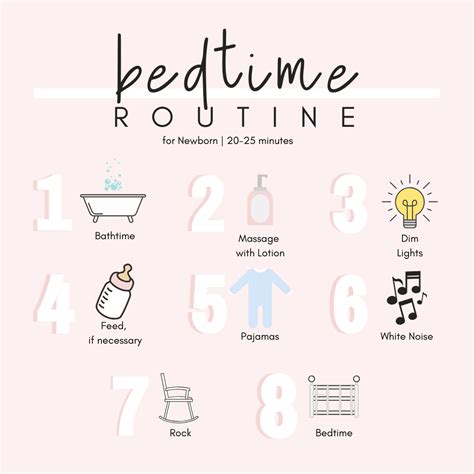Having a good night's rest is essential for maintaining overall well-being and optimal functioning throughout the day. We all know how frustrating it can be when we have trouble falling asleep or waking up feeling tired and groggy. However, there are effective strategies you can incorporate into your daily routine to enhance the tranquility of your nights and wake up feeling refreshed and energized.
Incorporate a Relaxing Bedtime Routine
Creating a consistent bedtime routine can signal to your body that it's time to unwind and prepare for sleep. Engage in soothing activities such as reading a book, listening to calming music, or taking a warm bath. Establishing a regular routine can help relax your mind and body and improve your sleep quality.
Consider the Impact of Your Sleep Environment
Optimizing your sleep environment is crucial for better sleep. Make sure your bedroom is quiet, cool, and comfortable. Use blackout curtains to block out any external light, invest in a supportive mattress, and choose cozy bedding that promotes relaxation. Additionally, minimizing electronic devices and reducing noise distractions can create a peaceful ambiance conducive to quality sleep.
Exercise Regularly, But at the Right Time
Physical activity has numerous benefits for sleep, including regulating your sleep-wake cycle and reducing stress levels. However, it is important to time your workouts appropriately. Exercising too close to bedtime may actually interfere with sleep, as it can increase alertness and adrenaline levels. Aim to finish your workouts at least a few hours before bedtime to allow your body to wind down and prepare for restful sleep.
Mind Your Diet and Hydration
What you consume throughout the day can greatly impact your sleep quality. Avoid consuming caffeine and heavy meals close to bedtime as they can disrupt sleep patterns and cause discomfort. Instead, opt for a light snack, such as a banana or a cup of herbal tea rich in sleep-promoting compounds like chamomile or lavender. Staying adequately hydrated throughout the day can also contribute to better sleep.
Establish a Consistent Bedtime Routine

Go to bed and wake up at the same time every day.
When it comes to improving the quality of your sleep, one key aspect to consider is the establishment of a consistent bedtime routine. This involves going to bed and waking up at the same time every day, even on weekends or days off. By following a regular sleep schedule, you help regulate your body's internal clock, also known as the circadian rhythm. This internal clock plays a crucial role in determining your sleep patterns and ensuring a restful and rejuvenating slumber.
Create a wind-down routine before bed.
Before hitting the sack, it is crucial to create a wind-down routine that prepares your body and mind for sleep. This may involve activities such as reading a book, taking a warm bath, practicing relaxation techniques like deep breathing or meditation, or listening to calming music. By engaging in these calming activities before bed, you signal to your body that it is time to relax and unwind, making it easier to fall asleep and stay asleep throughout the night.
Avoid stimulating activities close to bedtime.
Part of establishing a consistent bedtime routine involves avoiding stimulating activities close to your intended sleep time. These activities can include intense exercise, working on electronic devices such as smartphones or laptops, or consuming caffeine and other stimulating substances. Engaging in these activities too close to bedtime can interfere with the natural sleep-wake cycle and make it more challenging to fall asleep. Instead, focus on calm and soothing activities that promote relaxation and prepare your mind and body for a restful night's sleep.
Create a sleep-friendly environment.
In addition to following a consistent bedtime routine, it is essential to create a sleep-friendly environment in your bedroom. This means making sure your sleeping space is cool, quiet, and dark. Consider using blackout curtains, earplugs, or a white noise machine if necessary to block out any distractions or disturbances that may disrupt your sleep. Additionally, invest in a comfortable mattress, pillows, and bedding that provide adequate support and promote a comfortable sleep experience. Creating a peaceful and inviting sleep environment can significantly enhance the quality of your sleep.
Monitor and limit daytime napping.
While napping can be tempting, especially if you have had a poor night's sleep, it is important to monitor and limit daytime napping to improve sleep quality. If you do need to nap during the day, keep it short (around 20-30 minutes) and avoid napping too close to your regular bedtime. Long or late afternoon naps can interfere with your ability to fall asleep at night and disturb your overall sleep pattern. By monitoring and regulating your daytime napping habits, you can ensure that your body is ready for a restorative and uninterrupted sleep at night.
Stick to your routine consistently.
Establishing a consistent bedtime routine requires discipline and commitment. It is crucial to stick to your routine consistently, even on weekends or vacations. By maintaining a regular sleep schedule and following the same bedtime routine, you reinforce healthy sleep habits and allow your body to experience the full benefits of restful and restorative sleep. Consistency is key in optimizing sleep quality and overall well-being.
Create a Serene Resting Environment
Establishing a tranquil setting for sleep can significantly contribute to improving both the duration and quality of your slumber. By carefully curating your sleep environment, you can create a soothing atmosphere that promotes relaxation and enhances the effectiveness of your restorative rest.
- Choose a comfortable mattress and pillows that provide adequate support for your body, helping to alleviate any discomfort that might disrupt your sleep.
- Ensure your bedroom is kept at a cool and consistent temperature, as a pleasant and optimal ambiance can contribute to a more restful sleep experience.
- Minimize any external noise by using earplugs, white noise machines, or even trying out soothing sounds like nature recordings or soft music, helping you drift off into a peaceful slumber undisturbed.
- Invest in quality blackout curtains or blinds that effectively block out any excess light from outside, creating a cozy and dimly-lit environment ideal for promoting sleepiness.
- Declutter your sleeping area, ensuring that it remains neat and organized. A clean and tidy space can aid in reducing stress and promoting a calm state of mind conducive to sleep.
- Consider incorporating relaxing aromas into your sleep environment, such as lavender essential oil or scented candles, which have been shown to have soothing effects on the mind and body, preparing you for a restful night's sleep.
- Limit the use of electronic devices, such as smartphones and tablets, in your bedroom. The blue light emitted by these devices can disrupt your circadian rhythm and interfere with the production of the sleep-inducing hormone, melatonin.
- Implement a bedtime ritual that involves engaging in activities that promote relaxation, such as reading a book, practicing gentle stretching or meditation, or taking a warm bath before sleep.
By masterfully curating a relaxing sleep environment tailored to your preferences, you can establish the ideal conditions for achieving a restorative and rejuvenating night's sleep, allowing you to wake up feeling refreshed and ready to take on the day ahead.
Avoiding Stimulants Before Bed

Creating a conducive sleep environment is crucial for a restful night's sleep. In order to achieve optimal sleep quality, it is important to be mindful of the substances we consume before bedtime. Avoiding the intake of stimulants can greatly contribute to a better sleep experience, enhancing relaxation and promoting a deeper sleep state through the night.
| Stimulants | Description | Alternatives |
|---|---|---|
| Caffeine | Commonly found in coffee, tea, soda, and chocolate, caffeine is known to increase alertness and interfere with the natural sleep-wake cycle. | Opt for decaffeinated beverages or herbal tea options in the evening to reduce the intake of caffeine. |
| Nicotine | Often present in cigarettes, nicotine acts as a stimulant that can disrupt sleep patterns and inhibit falling asleep easily. | Avoid smoking before bedtime and consider nicotine replacement therapies to gradually reduce nicotine dependence. |
| Alcohol | While alcohol may initially induce drowsiness, it can negatively impact the quality of sleep by interfering with normal sleep cycles and causing sleep disruptions. | Limit alcohol consumption before bed, and opt for a warm herbal tea or relaxation techniques instead. |
| Sugary Foods | High sugar foods, especially when consumed close to bedtime, can lead to energy spikes, making falling asleep more difficult. | Choose healthier, low-sugar snacks such as nuts, fruits, or yogurt as alternatives to satisfy late-night cravings. |
By consciously avoiding stimulants before bed, you can create an environment that promotes better sleep quality, allowing for a more restful and rejuvenating night's sleep. Prioritizing sleep-friendly habits and making mindful choices can have a positive impact on your overall well-being and lifestyle.
Minimize Exposure to Electronic Devices
Reducing the time spent using electronic devices can have a positive impact on the overall quality of sleep. By limiting exposure to technology, individuals can promote better sleep patterns and ensure a more restful night's rest.
One effective approach to limiting exposure to electronic devices is establishing a technology-free routine before bedtime. Instead of scrolling through social media or watching television, engaging in relaxing activities such as reading a book, practicing mindfulness, or taking a warm bath can help prepare the body and mind for sleep.
It is also recommended to keep electronic devices out of the bedroom, as the presence of phones, tablets, or computers can disrupt the sleeping environment. Opting for an alarm clock instead of relying on a mobile phone can minimize the temptation to check notifications or engage in late-night browsing.
In addition, turning off electronic devices at least an hour before bedtime can allow the brain to wind down and transition into a state of relaxation. The blue light emitted by screens can affect the production of melatonin, a hormone that regulates sleep. By avoiding exposure to this light, individuals can support the natural circadian rhythm and promote the onset of sleep.
By consciously limiting the use of electronic devices and creating a technology-free environment before sleep, individuals can enhance the quality of their sleep and experience improved restfulness and overall well-being.
Stay Active for a Restful Night's Sleep

Physical activity plays a crucial role in ensuring a good night's sleep. Engaging in regular exercise not only keeps your body fit and healthy but also helps improve the quality of your sleep. By incorporating consistent physical activity into your daily routine, you can experience a more restful and rejuvenating sleep.
Exercise promotes better sleep by increasing the production of endorphins, the "feel-good" hormones, which can reduce feelings of stress and anxiety that may interfere with sleep. It also helps regulate your body temperature, preparing it for optimal sleep conditions. Moreover, exercise helps to tire your muscles and releases any pent-up energy, making it easier for you to fall asleep and stay asleep throughout the night.
- Engage in at least 30 minutes of moderate-intensity aerobic exercise every day. Examples include brisk walking, jogging, cycling, or swimming.
- Incorporate strength training exercises into your routine, such as weightlifting or bodyweight exercises, to improve both your physical health and sleep quality.
- Aim to complete your exercise session at least a few hours before bedtime to allow your body and mind to wind down and prepare for sleep.
- Consider incorporating relaxation exercises, such as yoga or stretching, into your evening routine to promote relaxation and reduce muscle tension before bed.
- Remember to listen to your body and choose activities that you enjoy. This will increase your motivation to stay active and help you establish a sustainable exercise routine.
By prioritizing regular exercise in your daily life, you can pave the way for a better night's sleep. So put on your workout gear, lace up your sneakers, and get moving to improve your sleep quality and overall well-being.
Manage Stress and Anxiety Levels
Creating a calm and peaceful environment for sleep involves more than just ensuring a dark and quiet space. Managing stress and anxiety levels play a crucial role in improving sleep quality by promoting relaxation and creating a sense of tranquility.
One effective way to manage stress and anxiety is to practice relaxation techniques such as deep breathing exercises. By focusing on your breath and taking slow, deep inhales and exhales, you can activate the body's relaxation response and alleviate tension.
Engaging in regular physical activity is another powerful tool in reducing stress and anxiety. Exercise helps to release endorphins, also known as "feel-good" hormones, which can boost mood and minimize the impact of stress on your sleep.
Additionally, incorporating mindfulness practices into your daily routine can significantly reduce stress. Mindfulness involves being fully present in the moment and observing your thoughts and emotions without judgment. This practice can help to calm an overactive mind, allowing you to let go of tension and worry before bed.
Journaling can also be a helpful technique for managing stress and anxiety levels. By writing down your thoughts and feelings before bed, you can unload any worries or concerns, allowing your mind to relax and prepare for a restful sleep.
Furthermore, it's important to establish healthy boundaries and set aside time for self-care. Prioritizing activities that bring you joy and relaxation can help to lower stress levels and improve overall sleep quality. Whether it's reading a book, taking a bath, or spending time in nature, finding activities that help you unwind is an essential part of managing stress and anxiety.
In conclusion, managing stress and anxiety levels is vital for enhancing sleep quality. By incorporating relaxation techniques, engaging in physical activity, practicing mindfulness, journaling, and prioritizing self-care, you can create a peaceful and restorative sleep environment.
Stick to a Nourishing and Well-Balanced Eating Routine

One essential factor that significantly contributes to overall well-being is maintaining a healthy and balanced diet. The relationship between proper nutrition and sleep quality is closely intertwined. Making thoughtful choices about what you eat can positively impact your sleep patterns, enhance your energy levels, and promote better overall health.
Fuel your body with the right nutrients
Choosing foods rich in essential nutrients, such as vitamins and minerals, can play a crucial role in supporting a restful night's sleep. Incorporate a variety of fruits, vegetables, whole grains, and lean proteins into your daily meals. These foods provide essential vitamins and minerals that your body needs to function optimally, including those that contribute to a good night's sleep.
Avoid consuming excessive amounts of caffeine and sugary foods, as they can disrupt your sleep and decrease its quality.
Maintain a regular eating schedule
Establishing consistent meal times helps regulate your body's internal clock, also known as the circadian rhythm, which plays a crucial role in regulating sleep-wake patterns. Try to consume your meals at around the same time each day, allowing your body to anticipate and prepare for nourishment, making it easier to achieve a restful and uninterrupted night's sleep.
Avoid consuming heavy meals close to bedtime, as these can cause discomfort, indigestion, and disrupt your ability to fall asleep.
Hydrate adequately throughout the day
Staying properly hydrated is essential for maintaining optimal sleep quality. Dehydration can lead to various sleep disturbances, such as nighttime awakenings and difficulty falling asleep. Aim to drink an adequate amount of water throughout the day to keep your body properly hydrated. However, be mindful of reducing your fluid intake closer to bedtime to avoid disruptive nighttime trips to the bathroom.
Avoid consuming excessive amounts of alcohol, as it can negatively impact sleep quality and lead to disrupted sleep patterns.
Incorporating these practices into your daily routine and sticking to a nourishing and well-balanced eating routine can significantly improve your overall sleep quality, leaving you feeling refreshed, rejuvenated, and ready to conquer the day ahead.
Avoid Daytime Napping
Restraint during the day for a restful night: exploring the impact of avoiding daytime napping on enhancing sleep quality.
Resist the Temptation
During the day, it may be tempting to take a quick nap to combat fatigue or catch up on lost sleep. However, indulging in daytime napping can disrupt the natural sleep-wake cycle and hinder the overall quality of sleep.
Disturbance to Sleep Patterns
Napping during the day may lead to difficulties falling asleep at night, as it confuses the body's internal clock. The brain, when exposed to a sudden influx of sleep during the day, may struggle to prioritize sleep at night, resulting in restlessness and insomnia.
Impact on Sleep Structure
Daytime napping can also affect the structure of sleep. It can reduce the duration of deep sleep, which plays a crucial role in memory consolidation and restoration of physical and mental energy. Lack of deep sleep can leave one feeling groggy and less refreshed upon waking up.
Alternative Strategies
Instead of taking a nap, engaging in other activities to combat fatigue can provide better long-term results. Practicing light physical exercises, such as stretching or going for a short walk, can increase alertness and promote better sleep in the evening.
Keeping a Consistent Schedule
Establishing and maintaining a consistent sleep schedule is key to avoiding daytime napping and improving sleep quality. Going to bed and waking up at the same time each day helps regulate the body's internal clock and promote a healthy sleep-wake cycle.
In conclusion, resisting the urge to nap during the day can have a positive impact on overall sleep quality. By staying active and maintaining a consistent sleep schedule, one can promote better sleep at night and wake up feeling rejuvenated and well-rested.
Consider Natural Remedies for Restorative Sleep

Discover alternative approaches to promote deep and rejuvenating rest, without relying on conventional methods or medications. Incorporating natural remedies into your bedtime routine can help cultivate a tranquil environment conducive to quality sleep.
- Herbal teas: Sip on soothing infusions such as chamomile, valerian root, or passionflower tea before bedtime to relax the mind and body.
- Aromatherapy: Create a peaceful atmosphere by diffusing essential oils like lavender, bergamot, or cedarwood, known for their calming properties.
- Meditation and mindfulness: Engage in mindfulness practices or meditation exercises to quiet the thoughts and ease into a restful state of mind.
- Bedtime rituals: Establish a consistent routine that includes calming activities such as reading a book, taking a warm bath, or practicing gentle stretching to signal the body and mind that it's time for sleep.
- Light therapy: Ensure exposure to natural light during the day and limit exposure to artificial light before bed to regulate the sleep-wake cycle.
- Relaxation techniques: Practice relaxation techniques like progressive muscle relaxation or deep breathing exercises to release tension and induce tranquility.
Integrating these natural remedies into your sleep routine can enhance the quality of your rest, allowing you to wake up feeling refreshed, rejuvenated, and ready to tackle the day ahead.
FAQ
What are some tips for enhancing sleep quality?
Some tips for enhancing sleep quality include establishing a regular sleep schedule, creating a calming bedtime routine, optimizing the sleep environment, avoiding stimulants like caffeine before bed, and practicing relaxation techniques.
Why is it important to have a regular sleep schedule?
Having a regular sleep schedule helps regulate your body's internal clock, which promotes better sleep quality. It means going to bed and waking up at the same time every day, even on weekends.
How can a calming bedtime routine improve sleep quality?
A calming bedtime routine can signal your body that it's time to sleep. This could include activities like taking a warm bath, practicing relaxation exercises, reading a book, or listening to soothing music.
What can I do to optimize my sleep environment for better sleep quality?
To optimize your sleep environment, make sure your bedroom is cool, dark, and quiet. Use comfortable bedding, invest in a good mattress and pillows, and remove any electronics or other distractions that might interfere with sleep.
Why should I avoid consuming stimulants like caffeine before bed?
Consuming stimulants like caffeine before bed can interfere with your ability to fall asleep and stay asleep. It is recommended to avoid caffeine and other stimulants for at least 4-6 hours before bedtime to ensure better sleep quality.



